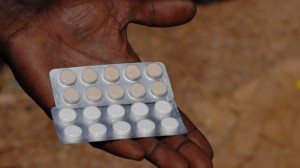A revolutionary training facility has been set up by the United States Pharmacopeial Convention to tackle the ever-omnipresent dilemma of counterfeit medicines in Africa. The Center for Pharmaceutical Advancement and Training, based in Accra, Ghana, will train medicine regulatory officers, and provide expertise and develop talent so that African nations can better regulate drugs.
Reports and studies indicate that in the past three years the extent of Africa’s problem with counterfeit medicines as a growing problem in desperate need of a solution. Most recently, a study assessing the quality of ergometrine and oxytocin on the Ghanaian market found that more than 94% samples failed either assay or sterility testing. Some of these medicines were found to be counterfeit, a problem frequently attributed to dismal medicine regulatory cont rols.
In June last year, 1.4 million packets of a counterfeit version of the antimalarial drug Coartem, sourced from China, were intercepted in Luanda, Angola. And a 2009 study on the quality of antimalarials in Uganda, Madagascar and Senegal found that 26%, 30% and 44% respectively of the samples collected failed the quality tests.
Although the extent of the counterfeit medicine problem is gradually becoming clear, universal solutions are still remaining elusive. The new Centre for Pharmaceutical Advancement and Training (CePAT) from the United States Pharmacopeial (USP) Convention was launched in May and is hoping to get things back on track.
“In Sub-Saharan Africa, there is tremendous need for human resource with the right technical expertise and know-how that will make the drug regulatory agencies effective in doing the job they are supposed to do,” said Dr. Patrick H. Lukulay, vice president of USP’s Global Health Impact Programs, who also oversees CePAT operations.
To date, the project has received US$1.5 million from USP. Six African nations’ ministries of health, including those of Ghana, Ethiopia, Kenya, Senegal, Sierra Leone, and Nigeria, have signed on partly because of USP’s long-term collaboration.
Initially, seven African personnel will undergo intensive training in the United States so they can train their colleagues on the continent. They will begin by offering CePAT training in dossier evaluation, good manufacturing practices and analytical techniques in laboratory work to 30 regulators; USP will foot the bill. After this initial free training, the African ministries of health will be expected to seek funding locally or from development partners to contribute to their training at the centre, said Lukulay.
CePAT will be self-sustaining after three years, he added. Plans for sustainability include building a quality control laboratory to test medicines for global health development partners, local pharmaceutical companies and regulatory agencies. CePAT will charge for the testing services, and use the money to run the centre.
Samuel Kwakye, head of medicine testing laboratory at Ghana’s Food and Drug Administration, said USP’s ongoing collaboration with Ghana and several sub-Saharan African countries is likely to make the project attractive to African regulators. In addition, the African pharmaceutical industries’ lack of adequate laboratory infrastructure for testing medicines may lead them to sign on to the project.
In Sierra Leone, Wilshire Johnson, registrar of the Pharmacy Board said Africa needs to do more to build the capacity of drug regulators to fight counterfeit medicine. “African countries should enact and enforce appropriate legislation that has strong punitive and preventive measures against counterfeiting.”
There is also a need to heighten communication to help in detecting counterfeit medicines in Africa, said Dr. Stephen M. Kimatu, an official with Kenya’s Pharmacy and Poisons Board. Kenya has an electronic system for reporting information on quality of medicines and adverse drug reactions for consumers and health professions and recommends that CePAT take a cue from it.
“CePAT can establish a portal where countries can actually … share information on counterfeit medicines,” says Kimatu, adding that an annual forum for sharing such information may also help African countries











